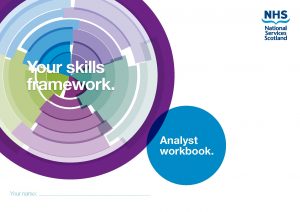Case Study – Development of a Skills Framework for Information Analysts in NHS National Services Scotland
Case study provided by Alison Bogle, Library Services Manager, Health Management Library, NHS National Services Scotland, Edinburgh.
Project outline:
A skills framework maps out the skills required for a job role, and they are widely used in the private and public sector. The Staff Development Team has developed and implemented a skills framework for a large group of staff in the organisation – information analysts. More skills frameworks for other groups of staff, such as those in data management roles, are to be developed over the next 12 – 18 months.
At the outset of the project, the Staff Development Manager asked the Health Management Library team to conduct a literature search around the use of competency frameworks in the public and private sectors, and also identify examples of competency frameworks used by other organisations and sectors which would be applicable to similar groups of professionals, such as statisticians, data analysts, project and programme managers and administrators. The literature search included searching a range of bibliographic databases, as well as a search of the grey literature and an internet search.
A few months later, we conducted a second search specifically to identify existing competency frameworks for data analysts.
Quote from service user:
“Starting with a literature search was the benchmarking part of the project to look at what was already out there being used in the public and private sectors. We wanted to benchmark the product that we were developing with existing tools and frameworks already in use. The literature search was also used to drive the decision making around the design of our product – we were able to compare the look and feel of other products. We found that most of the frameworks out there were just that: frameworks with lists of skills, whereas we wanted to develop ours into a practical tool, so the finished product we have developed is actually quite different from the frameworks identified in the literature search. The initial literature search really helped to accelerate the work, so that we were not starting from scratch or reinventing the wheel.”
Quote from staff member:
“It was clear from talking to information analysts that there was a gap in available development material for this group of staff. The Skills Framework will be an important part of wider plans for supporting staff development.
The Skills Framework describes what is expected of staff in a particular job role at each band. It supplements other job-related information such as job descriptions, post outlines and person specification documents.
The questions used in competency based interviews as part of the recruitment process will reflect the five core skills in the framework. It can be used as a self-assessment framework, as part of the performance review process, and when staff are considering new opportunities within their role, or applying for a new role or promotion. As a practical workbook, it can particularly support staff in assessing their readiness to move to the next level and in gaining confidence in their skills and role.”
Further information:
A candidate who has recently been through the external recruitment process for an information analyst role commented that she would have found it beneficial to have been able to read the Skills Framework before applying for a post within the organisation in order to gauge the level of post she should be applying for and tailor her application more appropriately. As a result of her feedback, there are now plans to publish the Skills Framework on the website.
The contribution of the Health Management Library team to this piece of work was acknowledged on the back cover of the Skills Framework for Analysts
